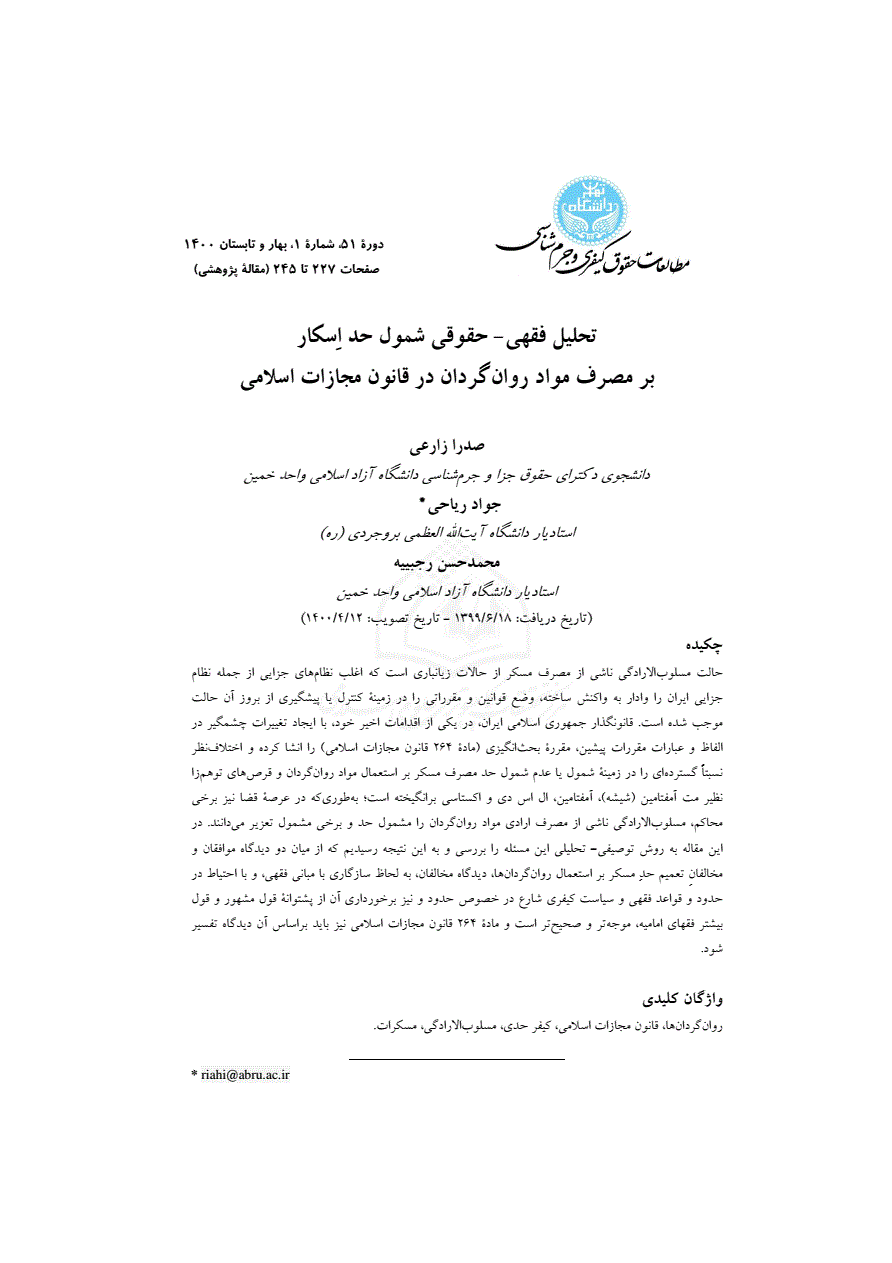
نویسنده: زارعی، صدرا ؛ رجبییه، محمد حسین ؛
نویسنده مسئول: ریاحی، جواد ؛
مطالعات حقوق کیفری و جرم شناسی بهار و تابستان 1400- شماره 16 رتبه ب (وزارت علوم/ISC (19 صفحه - از 227 تا 245 )
- دریافت فایل ارجاع :
-
(پژوهیار,
,
,
)
-
-

تحتاج دخول لعرض محتوى المقالة. إذا لم تكن عضوًا ، فتابع من الجزء الاشتراک.
إن كنت لا تقدر علی شراء الاشتراك عبرPayPal أو بطاقة VISA، الرجاء ارسال رقم هاتفك المحمول إلی مدير الموقع عبر
webmaster@noormags.com
.
You need Sign in to view the content of the article. If you are not a member, proceed from part Sign up.
If you fail to purchase subscription via PayPal or VISA Card, please send your mobile number to the Website Administrator via
webmaster@noormags.com
.
تحتاج دخول لعرض محتوى المقالة. إذا لم تكن عضوًا ، فتابع من الجزء الاشتراک.
إن كنت لا تقدر علی شراء الاشتراك عبرPayPal أو بطاقة VISA، الرجاء ارسال رقم هاتفك المحمول إلی مدير الموقع عبر
webmaster@noormags.com
.
You need Sign in to view the content of the article. If you are not a member, proceed from part Sign up.
If you fail to purchase subscription via PayPal or VISA Card, please send your mobile number to the Website Administrator via
webmaster@noormags.com
.
تحتاج دخول لعرض محتوى المقالة. إذا لم تكن عضوًا ، فتابع من الجزء الاشتراک.
إن كنت لا تقدر علی شراء الاشتراك عبرPayPal أو بطاقة VISA، الرجاء ارسال رقم هاتفك المحمول إلی مدير الموقع عبر
webmaster@noormags.com
.
You need Sign in to view the content of the article. If you are not a member, proceed from part Sign up.
If you fail to purchase subscription via PayPal or VISA Card, please send your mobile number to the Website Administrator via
webmaster@noormags.com
.
تحتاج دخول لعرض محتوى المقالة. إذا لم تكن عضوًا ، فتابع من الجزء الاشتراک.
إن كنت لا تقدر علی شراء الاشتراك عبرPayPal أو بطاقة VISA، الرجاء ارسال رقم هاتفك المحمول إلی مدير الموقع عبر
webmaster@noormags.com
.
You need Sign in to view the content of the article. If you are not a member, proceed from part Sign up.
If you fail to purchase subscription via PayPal or VISA Card, please send your mobile number to the Website Administrator via
webmaster@noormags.com
.
تحتاج دخول لعرض محتوى المقالة. إذا لم تكن عضوًا ، فتابع من الجزء الاشتراک.
إن كنت لا تقدر علی شراء الاشتراك عبرPayPal أو بطاقة VISA، الرجاء ارسال رقم هاتفك المحمول إلی مدير الموقع عبر
webmaster@noormags.com
.
You need Sign in to view the content of the article. If you are not a member, proceed from part Sign up.
If you fail to purchase subscription via PayPal or VISA Card, please send your mobile number to the Website Administrator via
webmaster@noormags.com
.
تحتاج دخول لعرض محتوى المقالة. إذا لم تكن عضوًا ، فتابع من الجزء الاشتراک.
إن كنت لا تقدر علی شراء الاشتراك عبرPayPal أو بطاقة VISA، الرجاء ارسال رقم هاتفك المحمول إلی مدير الموقع عبر
webmaster@noormags.com
.
You need Sign in to view the content of the article. If you are not a member, proceed from part Sign up.
If you fail to purchase subscription via PayPal or VISA Card, please send your mobile number to the Website Administrator via
webmaster@noormags.com
.
تحتاج دخول لعرض محتوى المقالة. إذا لم تكن عضوًا ، فتابع من الجزء الاشتراک.
إن كنت لا تقدر علی شراء الاشتراك عبرPayPal أو بطاقة VISA، الرجاء ارسال رقم هاتفك المحمول إلی مدير الموقع عبر
webmaster@noormags.com
.
You need Sign in to view the content of the article. If you are not a member, proceed from part Sign up.
If you fail to purchase subscription via PayPal or VISA Card, please send your mobile number to the Website Administrator via
webmaster@noormags.com
.
تحتاج دخول لعرض محتوى المقالة. إذا لم تكن عضوًا ، فتابع من الجزء الاشتراک.
إن كنت لا تقدر علی شراء الاشتراك عبرPayPal أو بطاقة VISA، الرجاء ارسال رقم هاتفك المحمول إلی مدير الموقع عبر
webmaster@noormags.com
.
You need Sign in to view the content of the article. If you are not a member, proceed from part Sign up.
If you fail to purchase subscription via PayPal or VISA Card, please send your mobile number to the Website Administrator via
webmaster@noormags.com
.
تحتاج دخول لعرض محتوى المقالة. إذا لم تكن عضوًا ، فتابع من الجزء الاشتراک.
إن كنت لا تقدر علی شراء الاشتراك عبرPayPal أو بطاقة VISA، الرجاء ارسال رقم هاتفك المحمول إلی مدير الموقع عبر
webmaster@noormags.com
.
You need Sign in to view the content of the article. If you are not a member, proceed from part Sign up.
If you fail to purchase subscription via PayPal or VISA Card, please send your mobile number to the Website Administrator via
webmaster@noormags.com
.
تحتاج دخول لعرض محتوى المقالة. إذا لم تكن عضوًا ، فتابع من الجزء الاشتراک.
إن كنت لا تقدر علی شراء الاشتراك عبرPayPal أو بطاقة VISA، الرجاء ارسال رقم هاتفك المحمول إلی مدير الموقع عبر
webmaster@noormags.com
.
You need Sign in to view the content of the article. If you are not a member, proceed from part Sign up.
If you fail to purchase subscription via PayPal or VISA Card, please send your mobile number to the Website Administrator via
webmaster@noormags.com
.
تحتاج دخول لعرض محتوى المقالة. إذا لم تكن عضوًا ، فتابع من الجزء الاشتراک.
إن كنت لا تقدر علی شراء الاشتراك عبرPayPal أو بطاقة VISA، الرجاء ارسال رقم هاتفك المحمول إلی مدير الموقع عبر
webmaster@noormags.com
.
You need Sign in to view the content of the article. If you are not a member, proceed from part Sign up.
If you fail to purchase subscription via PayPal or VISA Card, please send your mobile number to the Website Administrator via
webmaster@noormags.com
.
تحتاج دخول لعرض محتوى المقالة. إذا لم تكن عضوًا ، فتابع من الجزء الاشتراک.
إن كنت لا تقدر علی شراء الاشتراك عبرPayPal أو بطاقة VISA، الرجاء ارسال رقم هاتفك المحمول إلی مدير الموقع عبر
webmaster@noormags.com
.
You need Sign in to view the content of the article. If you are not a member, proceed from part Sign up.
If you fail to purchase subscription via PayPal or VISA Card, please send your mobile number to the Website Administrator via
webmaster@noormags.com
.
تحتاج دخول لعرض محتوى المقالة. إذا لم تكن عضوًا ، فتابع من الجزء الاشتراک.
إن كنت لا تقدر علی شراء الاشتراك عبرPayPal أو بطاقة VISA، الرجاء ارسال رقم هاتفك المحمول إلی مدير الموقع عبر
webmaster@noormags.com
.
You need Sign in to view the content of the article. If you are not a member, proceed from part Sign up.
If you fail to purchase subscription via PayPal or VISA Card, please send your mobile number to the Website Administrator via
webmaster@noormags.com
.
تحتاج دخول لعرض محتوى المقالة. إذا لم تكن عضوًا ، فتابع من الجزء الاشتراک.
إن كنت لا تقدر علی شراء الاشتراك عبرPayPal أو بطاقة VISA، الرجاء ارسال رقم هاتفك المحمول إلی مدير الموقع عبر
webmaster@noormags.com
.
You need Sign in to view the content of the article. If you are not a member, proceed from part Sign up.
If you fail to purchase subscription via PayPal or VISA Card, please send your mobile number to the Website Administrator via
webmaster@noormags.com
.
تحتاج دخول لعرض محتوى المقالة. إذا لم تكن عضوًا ، فتابع من الجزء الاشتراک.
إن كنت لا تقدر علی شراء الاشتراك عبرPayPal أو بطاقة VISA، الرجاء ارسال رقم هاتفك المحمول إلی مدير الموقع عبر
webmaster@noormags.com
.
You need Sign in to view the content of the article. If you are not a member, proceed from part Sign up.
If you fail to purchase subscription via PayPal or VISA Card, please send your mobile number to the Website Administrator via
webmaster@noormags.com
.
تحتاج دخول لعرض محتوى المقالة. إذا لم تكن عضوًا ، فتابع من الجزء الاشتراک.
إن كنت لا تقدر علی شراء الاشتراك عبرPayPal أو بطاقة VISA، الرجاء ارسال رقم هاتفك المحمول إلی مدير الموقع عبر
webmaster@noormags.com
.
You need Sign in to view the content of the article. If you are not a member, proceed from part Sign up.
If you fail to purchase subscription via PayPal or VISA Card, please send your mobile number to the Website Administrator via
webmaster@noormags.com
.
تحتاج دخول لعرض محتوى المقالة. إذا لم تكن عضوًا ، فتابع من الجزء الاشتراک.
إن كنت لا تقدر علی شراء الاشتراك عبرPayPal أو بطاقة VISA، الرجاء ارسال رقم هاتفك المحمول إلی مدير الموقع عبر
webmaster@noormags.com
.
You need Sign in to view the content of the article. If you are not a member, proceed from part Sign up.
If you fail to purchase subscription via PayPal or VISA Card, please send your mobile number to the Website Administrator via
webmaster@noormags.com
.
